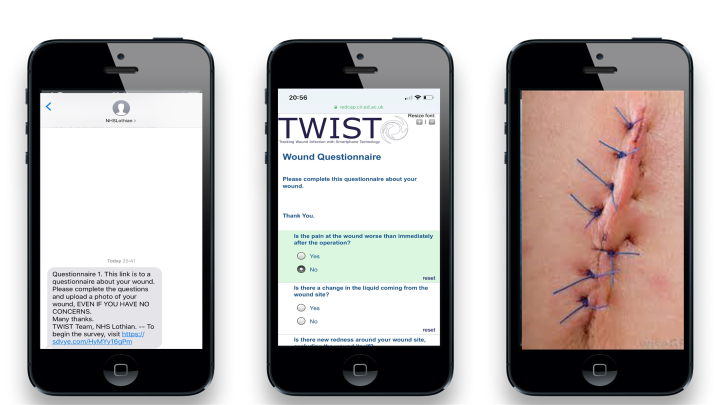INROADE
ImplementatioN of Remote surgical wOund Assessment during the coviD-19 pandEmic (INROADE).
INROADE is an implementational study conducted by the Surgical Informatics group which aims to improve how we monitor the healing of wounds after surgery.
This work is funded by a Medical Research Council (MRC) Confidence in Concept (CiC) grant, and is being conducted in collaboration with an industrial partner, ISLA Care Ltd, who provide a platform that allows patients and healthcare staff to securely communicate and share images/videos.
Background
Wound infections are the most common issues people have after surgery on the abdomen (for example, bowel surgery or Caesarean sections). Up to 1 in 9 patients develop these in the UK.
Not only can these be painful and unpleasant for people who experience them, but they can also develop into serious, potentially life-threatening infections. These can require antibiotic treatment and admission to hospital.
Picking up these infections quickly and reducing how severe these are is important for improving the care of patients who have had surgery.
"Proactive surveillance" for wound infection is a recent concept which hopes to use the potential of telehealth in order to facilitate real-time surveillance for wound infections, and potentially allow interventions to minimise the potential harm to patients.
Previous work
The INROADE study builds on a recent randomised control trial conducted by the Surgical Informatics group called "Tracking wound infection with smartphone technology" (TWIST).
This aimed to evaluate how effective proactive surveillance for surgical wound infections in 492 patients. Patients were given access to an online form where they were routinely prompted to information on how their wound from surgery was healing. Clinical advice was then provided to direct patients to appropriate care (if there was evidence of wound infection).

While the overall rates of wound infection remained the same between groups, when compared to patients receiving usual care after surgery, we found that:
- Almost 4x more patients were diagnosed with wound infections in the first 7 post-operative days compared to routine care.
- There was almost half the rate of community healthcare attendances, without increasing hospital attendances.
- Patients reported more positive experience regarding the ease of care access, as well as faster and higher quality advice.
Paper
This work was published in Nature Digital Medicine and received international news coverage, including by STV News, Daily Mail, the Times, Medscape.
McLean KA, Mountain KE, Shaw CA, et al. Remote diagnosis of surgical-site infection using a mobile digital intervention: a randomised controlled trial in emergency surgery patients. npj Digit. Med. 4, 160 (2021). doi: 10.1038/s41746-021-00526-0
- Video: STV News report on TWIST study
- STV News featured the results of our clinical trial on digital follow-up after surgery called "Tracking wound infection with smartphone technology" (TWIST). One of the patients involved and the lead author from the Surgical Informatics team (Centre for Medical Informatics, Usher Institute) discuss why this might become the new normal for surgery in the future. Reporter: Kaye Nicolson
Current work
In the current INROADE study, we are going to work out how we can put this proactive surveillance into practice, and understand how we can best adapt it to fit with the needs of patients and healthcare staff. This will include:
- Optimisation of the intervention - through iteratively developing and evaluating the intervention within a clinical research study involving surgical patients.
- Qualitative interviews with patients and staff to understand how care is currently perceived, and potential benefits and challenges with proactive surveillance.
- Development of an implementation strategy of how the final intervention could be put into practice at scale in NHS Lothian and other healthcare settings.
Start date: 1st July 2021
| Funder | Medical Research Council |
| Chief Investigator | Professor Ewen Harrison |
| Researchers | |
| Collaborator | ISLA Care Ltd |


